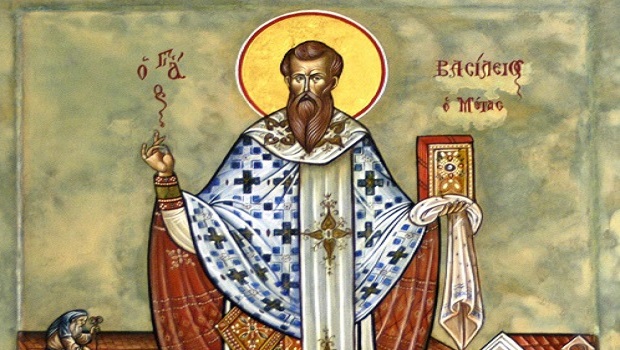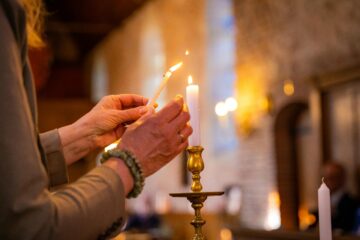The noted American historian, Dr. Henry Glassie, once observed, “History is not the past. History is a story about the past, told in the present, and designed to be useful in creating the future.”
On the Sunday of Orthodoxy, the First Sunday of Great Lent, we naturally look back at the past, and we remember it with reverence and pride. We call to mind the Seventh Ecumenical Council in 843 AD when the holy icons were firmly established as objects of veneration, reflecting the Incarnation of the Lord, the Divine Logos, into the fabric of our flesh and blood. The chants of the Synodikon, whereby the iconoclasts who freely and willfully separated themselves from the seminal truths of Orthodoxy, were pronounced “beyond the pale,” outside the household of the faith, spiritually estranged.
These historic remembrances were moments when the Church took a stand, when she defined precisely what she believed (not only that she believed), and thereby proclaimed the heart of our faith for all days and ages, for all times and seasons. That is why, in the words of the late Patristic scholar Fr. Joannes Quasten, “To a Church that is Orthodox, doctrine is precious.”
As we hold these holy icons in procession, however, we must understand that we are the Orthodox Church here and now, in the present, not a remote, dusty object of nostalgia. The Very Rev. John Erickson, former Dean of St. Vladimir’s Orthodox Theological Seminary, reminded us, “As we look back at the past, we must recall where we are – in 21st century America, not in 9th century Byzantium, not in the world of pious empresses and God-crowned emperors.”
Realistically, if not perhaps sadly, there is no longer a “Christian Empire” in this modern world, and the historic faith that we proclaim must be preached and lived in today’s zeitgeist (spirit of the times). This recalls the wisdom of the theologian Professor Christos Yannaras who wrote, “Sometimes the Church transfigures the world and sometimes the Church is transfigured by the world.” We are witnessing today the latter transfiguration.
The Triumph of Orthodoxy is not mere historic “triumphalism” that manifests itself in chest-thumping pride. It is, rather, the celebration of incarnating the truth of the Orthodox faith in the terms of the present milieu, in the language and constructs of this epoch and the souls in it who struggle to make sense of God, to get closer to God in cultures and societies that seem to fast be slipping away from Him. The world calls to the Church for a lived message of the Gospel of Christ today, here, and now! In answering that call is the Triumph of Orthodoxy, and the gifts we bring are profoundly spiritual, proven over centuries, and possessing a fire and power that speaks to the here and now and its quest for the Divine future.
The first thing we need to remember is that ours is an orthodoxy of life and not an orthodoxy of indoctrination. The heretics who were expelled in 843 AD were not so much those who confessed a false doctrine as those who had a false spiritual life and were moving along a false spiritual path. The truth of Orthodoxy is made for spiritual living, an internal spiritual activity rather than a logical construct or moral law. Yale theologian Mirolslav Volf underscores the importance of a “living” theology: “Theology matters because it is about what matters the most for human life – God. Theology worth its name is about what we ought to desire above all things for ourselves and for the world, about what we should desire in all the things that we desire. True theology matters because it is about the true life of the world – in and for God.”
This is the message that Orthodoxy needs to communicate (and defend) – the link between God and our life, the closeness to Him that is available to us, and the power we possess in God to change our individual lives and, indeed, the world. The Church (and we!) must never lose our prophetic voice, or cease to be leaven, light and salt in the world. The Church must never hide or withdraw into its own comfort or become museum-like in character. It ought never to be a matter of curiosity for the world rather than Light, of a yearning for “the good old days” rather than power and fire. Its spirituality must never be eclipsed by phyletism, that strange heresy that elevates ethnicity and culture over the Gospel. This would be an “un-Transfigured Church” whose message would increasingly fall dark upon eyes yearning to see the face of God and hearts craving rest only in Him.
The Orthodoxy that we extol on the First Sunday of Great Lent is not about the preservation or growth of an institution. The fact is that, like many other Christian groups, most of the Orthodox jurisdictions in America have declining congregations, according to the Pew Research Group. Some have long-standing declines in membership. The Triumph we are celebrating is our spiritual life, our way to God, the history of centuries of men and women who have made the free choice to walk the way of Orthodox asceticism, not as they conceive it or create it, but as it has been handed down to them in Holy Tradition. For this reason, Orthodoxy is primarily liturgical.
The Orthodox theologian Nikolai Berdyaev wrote, “Orthodoxy informs and enlightens the people not so much by sermons and the teaching of norms and laws, but by the Divine Services themselves which, like the holy icons we venerate, provide a foreshadowing of life transfigured.” Devoting our life to this Orthodoxy can make us different, it can transform us, it can lead us to deep conversion and true repentance – all through the mercy and love of the Thrice-Holy God in Whom we place our lives and our trust. Is this not reason enough to be triumphant?
This Sunday, as we do every year, we give thanks for our faith, our witness, and our conviction that truth is not a matter of logic, but of the heart. It’s message is not designed to stimulate our brain but to change our soul, to give us a glimpse of the Noetic vision, an experience of the mystical encounter with God and the changing of our lives as a result of it. Let us end by reflecting on the conclusion of the Holy Synodikon of the Seventh Ecumenical Council in 843. Let us make it our fervent prayer.
“As the Prophets beheld, As the Apostles taught, As the Church received, As the Teachers dogmatized, As the Universe agreed, As Grace illumined, As the Truth revealed, As falsehood passed away, As Wisdom presented, As Christ awarded, Thus we declare, Thus we assert, Thus we proclaim Christ our true God and honor His saints, In words, In writings, In thoughts, In sacrifices, In churches, In holy icons. On the one hand, worshipping and reverencing Christ as God and Lord. And on the other hand, honoring and venerating His Saints as true servants of the same Lord.
This is the Faith of the Apostles. This is the Faith of the Fathers. This is the Faith of the Orthodox. This is the Faith which has established the Universe.” Amen!
ABOUT THE ORTHODOX CHRISTIAN NETWORK
Orthodox Christian Network (OCN) is a 501(c)3 and an official agency of the Assembly of Canonical Bishops of the United States of America . It is a recognized leader in the Orthodox Media field and has sustained consistent growth over twenty-two years. We have worked to create a community for both believers and non believers alike by sharing the timeless faith of Orthodoxy with the contemporary world through modern media. We are on a mission to inspire Orthodox Christians Worldwide. Click to signup to receive weekly newsletter.
Join us in our Media Ministry Missions! Help us bring the Orthodox Faith to the fingertips of Orthodox Christians worldwide! Your gift today will helps us produce and provide unlimited access to Orthodox faith-inspiring programming, services and community. Don’t wait. Share the Love of Orthodoxy Today!


0 Comments